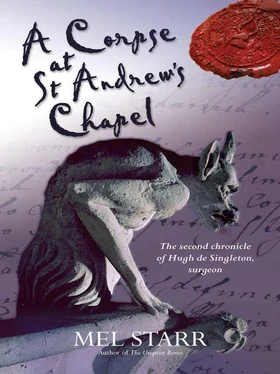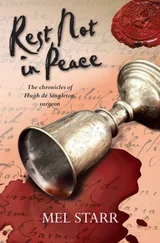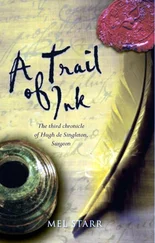Mel Starr - A Corpse at St Andrew's Chapel
Здесь есть возможность читать онлайн «Mel Starr - A Corpse at St Andrew's Chapel» весь текст электронной книги совершенно бесплатно (целиком полную версию без сокращений). В некоторых случаях можно слушать аудио, скачать через торрент в формате fb2 и присутствует краткое содержание. Год выпуска: 2010, Издательство: Kregel Publications, Жанр: Исторический детектив, на английском языке. Описание произведения, (предисловие) а так же отзывы посетителей доступны на портале библиотеки ЛибКат.
- Название:A Corpse at St Andrew's Chapel
- Автор:
- Издательство:Kregel Publications
- Жанр:
- Год:2010
- ISBN:нет данных
- Рейтинг книги:5 / 5. Голосов: 1
-
Избранное:Добавить в избранное
- Отзывы:
-
Ваша оценка:
- 100
- 1
- 2
- 3
- 4
- 5
A Corpse at St Andrew's Chapel: краткое содержание, описание и аннотация
Предлагаем к чтению аннотацию, описание, краткое содержание или предисловие (зависит от того, что написал сам автор книги «A Corpse at St Andrew's Chapel»). Если вы не нашли необходимую информацию о книге — напишите в комментариях, мы постараемся отыскать её.
A Corpse at St Andrew's Chapel — читать онлайн бесплатно полную книгу (весь текст) целиком
Ниже представлен текст книги, разбитый по страницам. Система сохранения места последней прочитанной страницы, позволяет с удобством читать онлайн бесплатно книгу «A Corpse at St Andrew's Chapel», без необходимости каждый раз заново искать на чём Вы остановились. Поставьте закладку, и сможете в любой момент перейти на страницу, на которой закончили чтение.
Интервал:
Закладка:
“Did Thomas set snares for this, or is he accomplished with a bow and arrows…as you are?”
The priest did not reply. I returned the venison to the sack and motioned Kellet to the gate. Perhaps he feared I might again attempt to strangle him. He set out promptly.
The spire of St Beornwald’s Church glowed golden in the rising sun as we approached Bampton. Most of this journey was accomplished in silence, but for the wheezing of the fat priest. But as we came to Bushey Row a question occurred to me.
“What business had Thomas in Alvescot that he would knock me in the head and wish me dead rather than have me know of it?”
Kellet made no reply. He was unaccustomed, I think, to walking so fast. His only sound was to gasp for breath.
“I thought I trailed a poacher,” I continued, “but it seems odd to me that Thomas went to the town rather than the forest around it. ’Twas near midnight.”
Kellet held his silence. This one-sided conversation was becoming tiresome. “Poachers do business in the forest, not in a village. What business had Thomas at midnight in Alvescot?”
“Ask ’im,” the priest wheezed.
“I will. Just thought you might want to provide your version of this tale before I hear from Thomas. A few days in the castle dungeon before I question him will surely loosen his tongue.”
“You’d believe a cotter before a man in holy orders?”
“Depends upon the cotter and the parson. The more I learn of you and Thomas the less likely I am to believe anything either of you say. But I suppose I shall be able to ferret out something like the truth of it.”
“And If I choose to say nothing?”
“Well,” I thought on this for a moment, “you’ve already said much…back in the chapel yard. Lord Gilbert will return from Pembroke soon. Perhaps he will get some truth from you if I fail.”
“I am the bishop’s man. I do not fear Lord Gilbert.”
“You think the Bishop of Exeter will defend you and cross Lord Gilbert? Lord Gilbert has powers to make life unpleasant even for a bishop. What influence have you?”
This was a new and unwelcome thought for the priest. He walked on silently. I thought the contemplation would do him good.
There were few townsmen about so early, but those who were at their business glanced at the priest and me with curiosity in their eyes. A townsman might be out of his bed and at his work before the Angelus Bell, but it was unlikely Lord Gilbert’s bailiff and the priest of St Andrew’s Chapel would be. Unless some unusual circumstance had occurred. The commons are not so doltish as churchmen and gentlemen may believe. Those who watched as Kellet and I strode down the Broad Street to Church Street knew something was amiss.
Thomas de Bowlegh’s cook was at his work. A column of smoke rose from the vicarage chimney into the still air of dawn. So Kellet and I did not wait long after I rapped upon the vicarage door before the vicar’s yawning servant drew it open.
We were invited to warm ourselves before the fire while the servant went to wake his master. He hesitated when I asked him to do this. Some men awaken bright for the new day. Others are cranks until the sun is high and they have broken their fast. Thomas de Bowlegh is among the latter, as the servant well knew, and Kellet and I were about to learn.
I heard the vicar’s feet fall heavily upon the steps leading down from his room. A warning that an unhappy man was about to appear. Amazing how a man’s feet can echo his disposition. I have ever since that day sought to avoid discourse with Thomas de Bowlegh until after the third hour.
The fire and east window combined to provide enough light that the vicar could identify his interlopers. He took a step into the room, glared first at John Kellet, then at me, and said, “Well?”
“No,” I replied. “I am not well. I took two blows across my skull this night, and was dumped in a bed of nettles. In your service.” I can be as churlish as any other. Especially with two tender lumps above my ear and a foul headache.
The vicar’s eyes, drawn near closed in a frown, opened wide at my words. Two benches sat either side of the blaze. I shoved Kellet toward one and motioned the vicar toward the other.
“Sit,” I commanded, “and I will tell you who murdered Alan the beadle and Henry atte Bridge.”
“The same man slew both?” de Bowlegh gasped.
“Nay. But the deaths are tied. This priest,” I nodded toward Kellet, “was in league to do evil with Henry atte Bridge. When he saw that I lived and might identify Henry as my attacker on the road to Witney, he put an arrow into Henry’s back to silence him.”
“Arrow?” the vicar frowned. “I thought ’twas a dagger struck down the fellow. You said as much.”
“’Twas my error. I found an arrowhead embedded in Henry’s back when I examined him more closely. ’Twas this priest who drew the bow.”
“Not so,” Kellet exploded. “He cannot prove so.”
This charge and the priest’s denial so startled de Bowlegh that he did not think to ask when the inspection took place which brought forth an arrowhead from Henry atte Bridge’s hairy back. The question seemed not to occur to him, for he never asked it of me. So I never told him. ’Tis not only sleeping dogs that are best left to lie.
“Henry atte Bridge and this parson wished me dead, for they feared what I might discover about the death of Alan the beadle.”
Thomas de Bowlegh wore yet a frown, but not because of an early departure from his bed, I think. He was puzzled.
“Alan followed Henry one night as the cotter made his way from the town to St Andrew’s Chapel. Perhaps Alan had followed him in this journey before. But on this night Henry lay in wait, smashed Alan’s head with a rock from the hedgerow, then tore the beadle’s neck with a nail-studded block so we who found Alan might think his death the work of a wolf. But Henry was greedy. He took the shoes from Alan’s corpse and ’twas the shoes which betrayed his deed to me.”
“And this is why he fell upon you on the road?”
“Aye.”
“But what has Father John to do with this?” de Bowlegh asked, nodding toward the priest.
“He and Henry were in league. I do not yet know why, nor how, but poaching had to do with it. Henry took venison to this priest. It must have been payment, but for what I do not yet know.”
“’Twas a gift,” Kellet muttered. “I thought ’twas…a goat…or a leg of mutton Henry brought.”
“And why would he do so?” de Bowlegh asked, disbelieving.
“We was friends…of old.”
“And he could not give this gift in the day, but must do so at night, and kill a man to keep the gift secret?” the vicar scoffed.
“Now Henry’s brother is in the same business,” I continued. I picked up the sack and dumped its contents before de Bowlegh.
“Venison,” he growled through pursed lips, “or I miss my guess. Surely no goat.”
John Kellet, guilty or not, would be taken from my hands and tried before a church court. Thomas Becket had died to maintain that immunity. Right or wrong, I was not sorry to be rid of the fellow.
“I leave the priest to you. John Prudhomme has taken Thomas atte Bridge to the castle. I intend to let him sit in the dungeon for a day or two. He will be more likely to give the truth after a taste of life in a cell. I will call if I learn of the bargain between him and this…priest.”
De Bowlegh and Kellet sat glaring at each other. I thought I knew which glare would prove most effective.
I was eager to know more of this affair which I had uncovered, but I was also thirsty, tired, hungry, and suffering a headache. I went straight to the castle kitchen for a loaf hot from the oven, not even pausing on the bridge over Shill Brook. I took a tankard of ale to my chamber and added a handful of ground willow bark and lettuce to the ale. This was effective, for I was asleep as soon as I went to my bed.
Читать дальшеИнтервал:
Закладка:
Похожие книги на «A Corpse at St Andrew's Chapel»
Представляем Вашему вниманию похожие книги на «A Corpse at St Andrew's Chapel» списком для выбора. Мы отобрали схожую по названию и смыслу литературу в надежде предоставить читателям больше вариантов отыскать новые, интересные, ещё непрочитанные произведения.
Обсуждение, отзывы о книге «A Corpse at St Andrew's Chapel» и просто собственные мнения читателей. Оставьте ваши комментарии, напишите, что Вы думаете о произведении, его смысле или главных героях. Укажите что конкретно понравилось, а что нет, и почему Вы так считаете.












